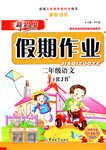题目内容
——she told me she had met you in London last year.——______you______her since?
A.Had;met B.Did;see C.Would;meet D.Have;seen
D

 学练快车道快乐假期寒假作业系列答案
学练快车道快乐假期寒假作业系列答案 新思维寒假作业系列答案
新思维寒假作业系列答案
| |||||||||||||||||||||||||||||||||||||||||||||||||||||||||||
I stood outside New York’s Madison Square Garden and just stared, almost speechless. I was a farm boy from County Kilkenny, a child who some thought would never walk, let alone go as far as I had in the world.
From the day I was born, there was a problem. The doctors at the Dublin hospital told my parents I had phocomelia, a deformity that affected both legs below the knee, which were outward and shorter than normal and each foot had just three toes.  Life was tough. I couldn’t stand, much less walk. I rarely left the farmhouse—and then only in someone’s arms. Mom bundled me up whenever she took me to town, no matter the season.
Life was tough. I couldn’t stand, much less walk. I rarely left the farmhouse—and then only in someone’s arms. Mom bundled me up whenever she took me to town, no matter the season.
“The world will see him when he can walk,” she told Dad. “And he will walk.”
Mom devoted herself to helping me. She tried everything to get me on my feet. When I was three, she and Dad took me to a clinic in Dublin.
A few weeks later we returned to Dublin with my artificial limbs (肢). Back home I practiced walking with my new limbs.
“There’s nothing anyone can do but you can’t,” Mom said. “You and I are going to walk through town.”
The next day Mom dressed me in my finest clothes. She wore a summer dress and fixed her hair and makeup. Dad drove us to the church. We stepped out of the car. Mom took my hand. “Hold your head up high, now, Ronan,” she said.
We walked 300 meters to the post office. It was the farthest I’d walked, and I was sweating from the effort. Then we left the post office and continued down the street, Mom's eyes shining with a mother's pride.
That night, back on our farm, I lay exhausted on my bed. It meant nothing, though, compared to what I’d done on my walk.
Then I began to pursue my dream of singing. And at every step Mom's words came back to me—Ronan, you can do anything anyone else can do—and the faith she had in God, who would help me do it.
I’ve sung from the grandest stages in Europe, to music played by the world’s finest musicians. That night, I stood at the Madison Square Garden, with Mom’s words chiming in my ears. Then I began singing. I couldn't feel the pulse of the music in my feet, but I felt it deep in my heart, the same place where Mom’s promise lived. 
【小题1】What was the problem with the author as a baby?
| A.He was expected unable to walk. |
| B.He was born outward in character. |
| C.He had a problem with listening. |
D.He was shorter than a normal baby. |
| A.shortcoming | B.disadvantage |
| C.disability | D.delay |
| A.To hide their depressed feeling. |
| B.To indicate it an unusual day. |
| C.To show off their clothes. |
D.To celebrate his successful operation. |
| A.determined | B.stubborn | C.generous | D.distinguished |
 【小题5】According to the writer, what mattered most in his success?
【小题5】According to the writer, what mattered most in his success? | A.His consistent effort. | B.His talent for music. |
| C.His countless failures. | D.His mother’s promise. |
There was a story many years ago of a school teacher--- Mrs. Thompson. She told the children on the first day that she loved them all the same. But that was a lie. There in the front row was a little boy named Teddy Stoddard. He didn’t play well with the other children and he always needed a bath. She did not like him.
Then Mrs. Thompson got to know that Teddy was actually a very good boy before the death of his mother. Mrs. Thompson was ashamed of herself. She felt even worse when, like all her other students, Teddy brought her a Christmas present too. It was his mother’s perfume(香水)。
Teddy said, “Mrs. Thompson, today you smell just like my Mom used to.” After the children left she cried for at least an hour. On that very day, she stopped teaching reading, writing and math. Instead, she began to teach children.
Mrs. Thompson paid particular attention to Teddy. The boy’s mind seemed to come alive. The more she encouraged him, the faster he improved. By the end of the sixth grade, Teddy had become one of the smartest children in the class.
Six years went by before she got a note from Teddy. He wrote that he had finished high school, third in his class, and she was still the best teacher he ever had in his whole life. He went to college. Mrs. Thompson got two more letters from him with the last one signed: Theodore F. Stoddard, M. D.(医学博士).
The story doesn’t end there. On his wedding day, Dr. Stoddard whispered in Mrs. Thompson’s ear, “Thank you, Mrs. Thompson, for believing in me. You made me feel important and showed me that I could make a difference.”
Mrs. Thompson, with tears in her eyes, whispered back, “Teddy, you have it all wrong. You were the one who taught me that I could make a difference. I didn’t know how to teach until I met you.”
【小题1】What did Mrs. Thompson do on the first day of school?
| A.She made Teddy feel ashamed. |
| B.She asked the children to play with Teddy. |
| C.She changed Teddy's seat to the front row. |
| D.She told the class something untrue about herself. |
| A.He often told lies. |
| B.He was good at math. |
| C.He needed motherly care. |
| D.He enjoyed playing with others. |
| A.She taught fewer school subjects. |
| B.She became stricter with her students. |
| C.She no longer liked her job as a teacher. |
| D.She cared more about educating students. |
| A.She had kept in touch with him. |
| B.She had given him encouragement. |
| C.She had sent him Christmas presents. |
| D.She had taught him how to judge people. |